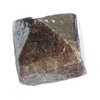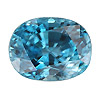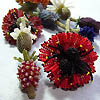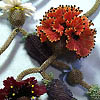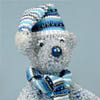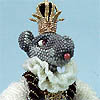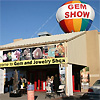December, 2010

Happy holidays!The holiday season is for family gatherings, fattening goodies, and flickering lights. We love you all and wish you best of luck and happiness in 2011! Have a rest and enjoy your reading, in the final issue of our 2010 year newsletter:
Zircon fact sheet
Contact us with any questions at
info@mylovelybeads.com.
Fashion Colorworks 2011 is starting! Featured artist - Birgit Bergemann Back to childhood. Uliana Volkhovskaya Jewelry Making Classes at the Bead Art Fair 2011 Step by step - tutorials December upcoming events Best regards, MyLovelyBeads.com Team
|
|
|
|
Zircon fact sheetAccording Wikipedia, the modern birthstones for December are turquoise and blue topaz. One of the traditional gems is zircon, don't confuse it with zirconia or cubic zirconia! Zircon is a mineral belonging to the group of nesosilicates. The natural color of zircon varies between colorless, yellow-golden, red, pink, brown, blue, green, hazel, and black. The color of zircons sometimes can be changed by heat treatment. Depending on the amount of heat applied, colorless, blue, and golden-yellow zircons can be made. Colorless specimens that show gem quality are a popular substitute for diamond; these specimens are also known as Matura diamond. Yellow zircon is called hyacinth, from the flower hyacinthus, whose name is of Ancient Greek origin. In the Middle Ages all yellow stones of East Indian origin were called hyacinth, but today this term is restricted to the yellow zircons. The name either derives from the Syrian word ZARGONO, from the Arabic word ZARQUN, meaning vermilion, or from the Persian ZARGUN, meaning golden-colored. These words are corrupted into "jargoon", a term applied to light-colored zircons. The English word "zircon" is derived from "zirkon", which is the German adaptation of these words. Zircon is a remarkable mineral, if only for its almost ubiquitous presence in the crust of Earth. Large zircon crystals are seldom abundant. Their average size is about 0.1-0.3 mm, but they can also grow to sizes of several centimeters (a few inches). Zircon is a common accessory mineral that occurs worldwide. Noted occurrences include: Australia, Barbados, Russia (Ural Mountains), Italy, Norway, Sri Lanka, India, Indonesia, Thailand, Cambodia, Republic of South Africa, Madagascar, Canada, the United States (Massachusetts, New York, North Carolina, Colorado, Texas). Australia leads the world in zircon mining, producing 37% of the world total and accounting for 40% of world economic demonstrated resources for the mineral. Zircon has long had a supporting role to more well known gemstones, replacing them when they were unavailable. In the middle ages, zircon was said to aid sleep, bring prosperity, and promote honor and wisdom in its owner. Zircon jewelry should be stored carefully because although zircon is relatively hard, it can abrade and facets can chip. |
|
Fashion Colorworks 2011 is starting! |
|
Featured artist - Birgit Bergemann
Our featured artist today is Birgit Bergemann from Germany. Birgit is a unique person who can make jewelry, teach beading classes, and host a bead shop. It's not easy! Birgit says, "When I was in school my favorite classes were arts, mathematics and sports. I liked geometrical and three-dimensional shapes, but and I couldn't have thought that my life would be associated with beads later. In 2003 I knew beads, started beading and soon turned that from a hobby to a profession. I love jewelry as most women do, there must be a "magpie-gene" inside of me. I love fine filigreed, detailed works, and both I sum up in this craft. After I had received an old German book about different crafts I read about some beadwork and was hooked on that. My other beloved hobbies were put aside, and only sometimes I can turn back to a Jane Austin or Tess Gerritsen book. In past I had hundreds of things lying around, most of them not finished. Since I started beading I have become a very tidy person. I sit at my desk, wear my magnifier and come at peace with myself. I seem to have a special smile on my face, since I began beading; at least my husband says so. Even my house and decoration have turned around the tiny beads by now, and my everyday life has been altered. My family completely supports me and is proud of what I have done up to now. Since I opened my well known online shop I have divided my days in mornings, when I work for the shop, and afternoons when I dedicate my time to beads and design new jewelry. In 2007 I lost my job and soon my unemployment benefits came to the end. No new job was in sight. An employee of a large bead shop asked me if I could fathom to start being self-employed and to sell my beadworks on a commission base. I was kind of afraid of the risk involved and had to think about it. My husband and I have discussed that issue for a while and then I decided to start this new adventure. Why could I see my future in this hobby? It was more of a feeling then knowledge; I have listened to my soul rather than to my head, I was pulled into this sort of talk. As long as we calculated carefully and decided that we wouldn't add up huge debts we could not loose too much. My advantage was that I already knew a lot about beads, their shapes and how to use them best of all, and how to work with them. I also believed that I was given a good feeling for colors and what to advise to customers."
Full article by Birgit Bergemann
|
|
Back to childhood. Uliana Volkhovskaya
You won't be indifferent looking at beadwork by Uliana Volkhovskaya! Intricate mini-sculptures by this artist make us amaze with the talent of her. We've asked Uliana for her story to publish a few times, but being very shy she refused. And happily, here we are! Interview with bead artist Uliana Volkhovskaya 1. Uliana, have you ever crafted before you started beadweaving? If yes, what type of crafts did you like? I have tried a lot, but a little at a time. To be more exact, if I had a chance I would try everything that could be made by hands. That's my necessity; my hands should be busy all the time. So, I was always knitting, sewing, drawing, sculpturing, etc. 2. When and why did you start beading? What inspired you? It began as it often can happen. My daughter brought home a gift made by her friend; it was a trinket with a beaded crocodile. I got interested in how this critter was made. Internet is a great thing! Surfing websites I found the forum for the bead lovers, keenness is also great. So, I started learning different bead techniques. I liked peyote stitch best of all. Beads are very tight to each other, the thread is almost not visible, and the beaded surface is pretty solid and flexible. Then I learned how to change shape of beaded canvas according design, and began my mini-sculptures! So, the main technique applied in my work is peyote stitch; but I use other stitches, too. That allows making beadwork more complicated and interesting. On my way I have learned that many types of beads exist, and beads differ by material, transparency, color, shape, size, hole, and so on. Possibilities for beadwork are unlimited! 3. How have you learned beadweaving? Who were your teachers? No one, just Internet. I'm a self-taught beadweaver, nobody taught me and I have never taken any classes. 4. Which bead designers inspire you in creativity and why? I cannot name the designers whose works could be samples for my beadwork, but in general I like seeing different items to look for inspiration. 5. Have you had favorite designers? If yes, who they are and why? Of course, there are a lot of eye-catching beadworks that amaze me and give me aesthetic pleasure. They can be works by well known beaders as well as by beginners; some beadworks can excite very strong feelings. Sometimes an interesting color combination, unusual shape and design can inspire me; sometimes that's the story behind an item creation.
Full interview with Uliana Volkhovskaya
|
|
Jewelry Making Classes at the Bead Art Fair 2011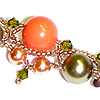
The friends of bead art in Europe have waited for a long time for such an event - finally in 2011 it will take place! Perlen Poesie Magazine is proud to invite you to the First Bead Art and Jewelry Accessory Show in Europe! International artists, manufacturers, retailers and beading friends from all over Europe and Overseas will meet at this unmatched event. The program includes different jewelry making classes that will be taught by internationally recognized bead artists: Laura Andrews, Jutta Tolzmann, Petra Tismer, Ute Kluwe, Sabine Lippert, Zoya Gutina, Kerrie Slade, Katharina Dietrich, Anja Schlotmann, Birgit Bergemann, Elke Leonhardt-Rath, Martina Nagele and other artists. The classes by Zoya Gutina are GU-04/04A and GU-07/07A. |
|
Step by step - tutorials
We hope you enjoyed reading the interview with the beautiful artist Uliana Volkhovskaya who makes one-of-a-kind mini-sculptures. She is glad to share her skills and knowledge with you and decided to write a tutorial exclusively for our newsletter - to teach you how to make mini-sculptures. 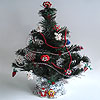
Today we publish New Year's small tutorial by Viktoria Katamashvili. We hope you'll find them useful for you. Viktoria Katamashvili also provided a few samples of using beaded items in jewelry making. |
|
Upcoming events
January 28 - February 8, 2011 J.O.G.S. Gem and Jewelry Show is the largest and most popular independent jewelry trade show in the Tucson, Arizona area. Wholesale jewelry manufacturers, miners and international dealers gather in Tucson every winter.
January 28, 29, 30, 2011 Juried Fine Art & Craft Festivals since 1976. Find the unique handcrafted artwork of thousands of American Artists! Decorative creations for home & garden, exceptional fine art & designer crafts! |
|
Note
If you don't see the newsletter properly formatted please click here:
December Issue
|
© 2010 MyLovelyBeads.com All Rights Reserved.
If you do not want receive our newsletter and you wish to remove your email address from our mailing list, please click the following link to unsubscribe.



